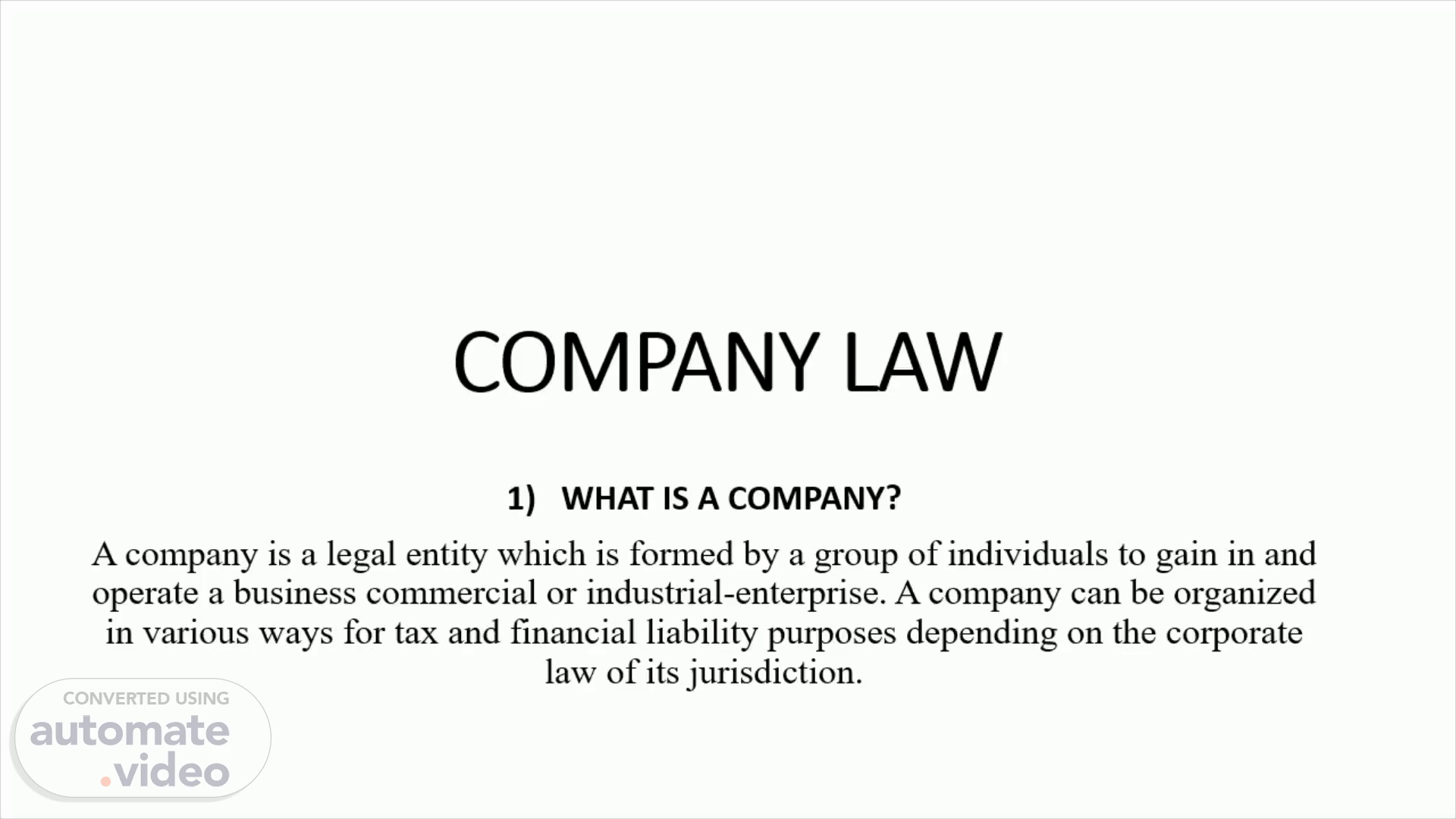Scene 1 (0s)
COMPANY LAW. WHAT IS A COMPANY? A company is a legal entity which is formed by a group of individuals to gain in and operate a business commercial or industrial-enterprise. A company can be organized in various ways for tax and financial liability purposes depending on the corporate law of its jurisdiction..
Scene 2 (15s)
2) FEATURES OF A COMPANY. There are various features of a company and that is :- Voluntary Association :- A company is formed with two or more persons. They cannot be form from a single person. Artificial Person :- Company is always an artificial person. 3) Separate Entity :- The company law recognize the independent status of the company. It implies that company cannot be held liable for the action of its members and opposite..
Scene 3 (35s)
4) Limited Liability :- It means that if the assets of a company fall short of its liabilities, the members cannot be asked to contribute anything more than the unpaid amount on the shares held by them. 5) Separation of Ownership from Management :- A company is managed by the elected representatives of its members. Though shareholders of a company are its owners, yet every shareholder, unlike a partner, does not have a right to take an active part in the day-to-day management of the company..
Scene 4 (58s)
3) KINDS OF COMPANY. Company can be classified into different types based on the mode of incorporation, the liability of the members and the number of members. There are various types of company and that is :- 1) Royal Chartered Companies 2) Statutory Companies 3) Registered or Incorporated Companies.
Scene 5 (1m 13s)
4) Companies Limited by Shares 5) Companies Limited by Guarantee 6) Unlimited Companies 7) Public Company (or Public Limited Company) 8) Private Company (or Private Limited Company) 9) One Person Company.
Scene 6 (1m 24s)
4) EXPLANATION OF KINDS OF COMPANIES. Royal Chartered Companies :- These type of companies are created by Royal Charter. This means they are granted power or a right by the monarch or by special order of a king or a queen. 2) Statutory Companies :- Statutory Companies are companies incorporated by means of a special act passed by the central or state legislature. They are mostly invested with compulsory powers and are responsible to carry out some special business of national importance..
Scene 7 (1m 45s)
3) Registered or Incorporated Companies :- All the other companies which are incorporated under the companies’ act passed by the government comes under this head. These companies come under existence only after they register themselves under the act and the certificate of incorporation is passed by the Registrar of companies. 4) Public Company :- Public Company is separate from its members ( shareholders ) and the liability of its members is also limited. Atleast 7 members should be there to form a public company but there is no maximum limit on it. The company collects its capital by the sale of its shares to the shareholders..
Scene 8 (2m 12s)
5) Private Company :- Private Company‘s liability may be limited or Unlimited, it completely depends on company that what type of private company it is. At least 2 members should be there to form a private company but members cannot exceed 50. In Private Company, The rights to transfer its shares are restricted. In this company, Limited members are there. Any type of invitation to the public to subscribe for any shares or debentures of the company is completely prohibited..
Scene 9 (2m 34s)
6) One Person Company. OPC separate Legat entity. needs to registered. The Uat*tlty of the sharehotd«/ t*recttr Is Utnlted. It Involves and Is a tone- consutnlng process. ww.taxguru.in it's dit•flctdt to run due to fortnautles board meetings. aucnt etc. The credlt history Of the Is want to b«row futuls..
